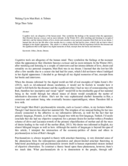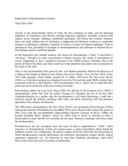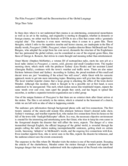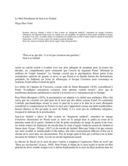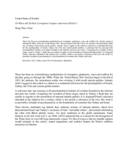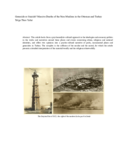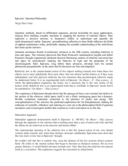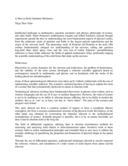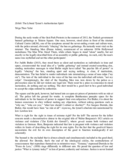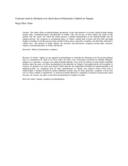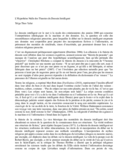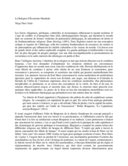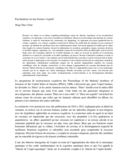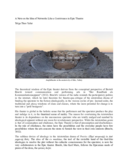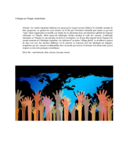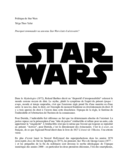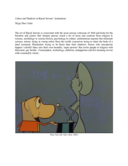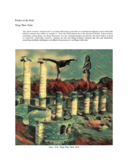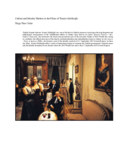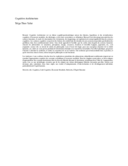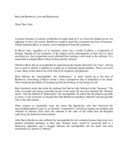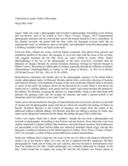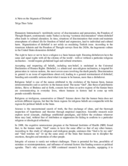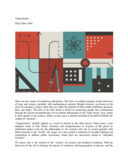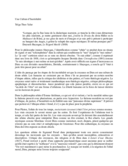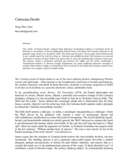Tolga Theo Yalur

°1985
orcid: 0009-0002-9267-2738
en
Born in Izmir, I studied Economics at Middle East Technical University (Ankara). I had my MA degree in Critical and Cultural Studies at Boğaziçi University (Istanbul). I visited New York in 2016-17 to attend philosophy and psychoanalysis courses at the New School. My research concerns cognitive philosophy, economics, film, media and culture, and my teaching includes media and culture courses in Turkey and the USA.
theoyalur@gmail.com
research
research expositions
-
Waking Up to Mari Ruti
(2025)
author(s): Tolga Theo Yalur
published in: Research Catalogue
Cognitive tools are allegories of the human mind. They symbolize the feelings at the moment when the appearances they illustrate become extimate and no more intimate. In the Winter 2023, after watching and listening to a couple of interviews and her intense debates of love, desire and sexuality on my personal computer, Mari Ruti was in my dream. I learned that she lost her life after a few months due to a cancer she had had for years, which I did not know when I indulged in her digital appearance. This article is a tribute to Mari Ruti of the felt experience both for the dreamer and the significant other in the light of my digital memories of Ruti, excerpts from her books and interviews.open exposition comments (3)
-
Department of Mockumentary Sciences
(2025)
author(s): Theo Yalur
published in: Research Catalogue
In the humanities and cultural sciences, the humor for fictionalizing a “truth” is described as “mocking”. Though it is more encountered in human sciences, this mode of structuration of events, happenings is also a significant concept in the STEM sciences. Mocking what is the kernel of truth of the Real, and what could be or what should be done about what is presented as the origin or the truth.open exposition comments (18)
-
The Film Pontypool (2009) and the Deconstruction of the Global Language
(2025)
author(s): Tolga Theo Yalur
published in: Research Catalogue
In these days when it is not understood that cinema is an entertaining, commercial monotheism as well as an art in the making, and originality is starting to disappear, whether in domestic or foreign cinema, we either wait for festivals or DVDs to see a film that comes with a ‘genuinely original idea’. The situation is even more worrying when it comes to a genre film. These thoughts, which I refer to the repetitive zombie and horror cinema, are inadequate in the film of deadly words, Pontypool (2009), where Canadian director Bruce McDonald and Tony Burgess, who adapted the script from his own novel, dismantle the structure of the Englishness that has permeated the global culture, can be considered as one of the original genre films, like those of George A. Romero, that strives to create thought and meaning rather than entertainment.open exposition comments (0)
-
La Mort Freudienne de Jean-Luc Godard
(2025)
author(s): Tolga Theo Yalur
published in: Research Catalogue
Jean-Luc Godard a décrit le film comme un “diagnostic médical”, remettrant les images d’archives silencieuses de Sigmund Freud avant son suicide avec une morphine. En gardant le fait de pertes mondiales en temps de guerre et de virus, cet article retrace les itinéraires du suicide dans la visite d’Agnès Varda du manoir de Godard en Suisse dans i (2017) avant sa mort et le suicide assistré de Godard.open exposition comments (3)
-
An Authoritarian Dystopia
(2025)
author(s): Tolga Theo Yalur
published in: Research Catalogue
From the Gezi Park protests of 2013 onwards, Turkey has witnessed a troubling trajectory that reflects signs of an authoritarian dystopia —a word that might resonate with scholars of philosophy. This article interprets the variables of this authoritarianism, raising a question of law and exception on a local-global span. The modern panorama of Turkey presents an urgent case study for scholars examining the interplay between state power, civil liberties, and the public sphere.open exposition comments (0)
-
Monotheist Mythology
(2026)
author(s): Tolga Theo Yalur
published in: Research Catalogue
This article explores monotheistic religions as powerful linguistic and social structures that function through a mechanism of collective delusion. Drawing on Jacques Lacan’s structuralist insights, the text argues that these faiths are not based on objective history but are fictions codified long after the events they describe.open exposition comments (1)
-
Epicurus’ Quantum Philosophy
(2025)
author(s): Tolga Theo Yalur
published in: Research Catalogue
Quantum methods, based on differential equations, proved invaluable for many applications, ranging from building complex machines to mapping the motions of celestial objects. They represent a decisive advance in humanity's ability to understand and quantify the multi-dimensional reality. Epicurus’ groundbreaking reflection in these fields influence the fields of applied mathematics today, profoundly shaping the scientific understanding of the solid forms that make up the universe.open exposition comments (0)
-
Epicurus’ Quantum Philosophy
(2025)
author(s): Tolga Theo Yalur
published in: Research Catalogue
Quantum methods, based on differential equations, proved invaluable for many applications, ranging from building complex machines to mapping the motions of celestial objects. They represent a decisive advance in humanity's ability to understand and quantify the multi-dimensional reality. Epicurus’ groundbreaking reflection in these fields influence the fields of applied mathematics today, profoundly shaping the scientific understanding of the solid forms that make up the universe.open exposition comments (3)
-
A Note on Early Quantum Mechanics
(2025)
author(s): Tolga Theo Yalur
published in: Research Catalogue
Intellectual landscape in mathematics, quantum mechanics and physics, philosophy of science, and other fields. Henri Poincaré's mathematical insights and Albert Einstein's seminal thought experiments opened the door to understanding the most fundamental aspects of physical reality, from the subatomic realm of particles and fields to the largest galactic superclusters and the origin of the universe itself. The pioneering work of Poincaré and Einstein in the early 20th century fundamentally changed our understanding of the universe, calling into question long-held ideas about space, time, and the very core of reality. Epicurus’ groundbreaking reflection in these fields influence the fields of applied mathematics today, profoundly shaping the scientific understanding of the solid forms that make up the universe.open exposition comments (1)
-
Zübük: The Liberal Tyrant’s Authoritarian Spirit
(2025)
author(s): Tolga Theo Yalur
published in: Research Catalogue
During the early weeks of the Gezi Park Protests in the summer of 2013, the Turkish government banned gatherings in Taksim Square. One man, however, stood alone in front of the Ataturk Cultural Centre (AKM), one of the symptoms around the never-ending events and culture wars, with the police around, obviously "obeying" the ban on gatherings. He instantly went viral on the internet: The Standing Man (Duran Adam), reminiscent of an unknown 1950s Hollywood melodrama The Man Who Stood There, while others began to stand "alone" nearby, but not exactly in the legally described form of an assembly or public gathering. As such, only the man's name was mythified and not the other participants'.open exposition comments (10)
-
Concours entre la Séculaire et le Sacré dans le Patrimoine Culturel en Turquie
(2025)
author(s): Tolga Theo Yalur
published in: Research Catalogue
Cet article s’appuie sur une approche psychanalytique et culturelle des idéologies et de l’économie-politique dans les constructions de vérité et les récits autour des lieux et des événements concernant les identités ethniques, religieuses et nationales, et propose une opinion interdisciplinaire sur les récits de vérité des psycho-réalités culturelles formées autour des parcs, des lieux monumentaux et des génocides en Turquie. Cette opinion porte sur le complexe, le concours du profane et du sacré, pour lequel l’article présente une interprétation détaillée du matériel/mondain et du religieux/au-delà. Les symptômes dans les lieux monumentaux en Turquie, parc culturel à Izmir et Parc Gezi et Sainte-Sophie à Istanbul, révèlent les mythes inhabituels encodés dans ces lieux, génocides, complexes et leurs liens avec les textes culturels d’aujourd’hui. Le réseau de la réalité informe les symptômes conscients et inconscients autour des parcs, des musées, des places ou des lieux monumentaux en Turquie et au-delà.open exposition comments (5)
-
L’Hypothèse Nulle des Theories du Dessein Intelligent
(2025)
author(s): Tolga Theo Yalur
published in: Research Catalogue
Le dessein intelligent est le mot à la mode des créationnistes des années 2000 qui concerne l’interprétation idéologique de la machine et des données. Ici, la question est celle des ressemblances religieuses prescrites, pour lesquelles le débat sur le dessein intelligent emprunte aux données non corporelles pour projeter des incorporations fictives à l’information, en présumant des mentales de similitude, sinon d’exactitude, qui pourraient donner lieu à une création religieuse prescrite.open exposition comments (1)
-
L’Hypothèse Nulle des Theories du Dessein Intelligent
(2025)
author(s): Tolga Theo Yalur
published in: Research Catalogue
Le dessein intelligent est le mot à la mode des créationnistes des années 2000 qui concerne l’interprétation idéologique de la machine et des données. Ici, la question est celle des ressemblances religieuses prescrites, pour lesquelles le débat sur le dessein intelligent emprunte aux données non corporelles pour projeter des incorporations fictives à l’information, en présumant des mentales de similitude, sinon d’exactitude, qui pourraient donner lieu à une création religieuse prescrite.open exposition comments (0)
-
La Religion d’Économie Mondiale
(2025)
author(s): Tolga Theo Yalur
published in: Research Catalogue
Les forces religieuses, politiques, culturelles et économiques influencent le monde moderne. Il s’agit de conflits et d’antagonies bien réels, idéologiquement chargés, qui déchirent le monde dans un contexte de formes virulentes de polarisation idéologique, de nationalisme de droite et de fondamentalisme religieux.open exposition comments (0)
-
Psychanalyse est une Science Cognitif
(2025)
author(s): Tolga Theo Yalur
published in: Research Catalogue
Résumé: Cet article est un détour cognitif-psychanalytique autour des théories, hypothèses et des revendications cognitives, des idéologies, et des leurs conventions ou réfutations. Bien qu’il soit davantage rencontré dans les sciences humaines, la mode de structuration des événements, des happenings, est également un concept significatif dans les sciences cognitives. Les sciences cognitives conçoivent les fictions des realite faire des données du sens commun et postulats qui décident des problèmes dans leur conditionnement même. Sans doute apparaît-il d’emblée que les cadres dans lesquels les sciences humaines classent les phénomènes en sensations, perceptions, images, croyances, fonctions et travaillés logiques, jugements, etc., sont empruntés comme tels au travail de siècles de philosophie. Loin d’avoir été forgés pour une conception objective de la réalité humaine, ces cadres ne sont que les produits de la destruction abstraite où se tracent les vicissitudes d’un effort spécifique, qui pousse l’homme à chercher la confiance, la vérité, la conscience de soi et l’univers. Une confiance qui est transcendante dans sa position, et qui le reste donc dans la forme, même lorsque le philosophe en nie l'existence. Les tendances à une confiance absolue dans les explications naturalistes des phénomènes culturellement conditionnés exigent une un encadrer l'appropriation cognitive des concepts scientifiques. Dans les chapitres consécutives, ce livre critiques d'appropriations des concepts darwinienne dans les discours libérale détourne le darwinisme scientifique dans l’idée de s’appropriation moins avec ou aux technologies avancées que de les adapter aux valeurs idéologiques libérales croissantes qui elles- mêmes sont devenues plus autoritaires dans leurs règles non écrites d’entrepreneuriat, d’auto-évaluation et de développement individuel, particulièrement l’esprit humaine.open exposition comments (0)
-
A Note on the Idea of Networks Like a Contrivance in Epic Theatre
(2025)
author(s): Tolga Theo Yalur
published in: Research Catalogue
The theoretical wisdom of the Epic theater derives from the conceptual perspective of Bertolt Brecht toward communication and performing arts in "Der Rundfunk als Kommunikationsapparat" (1932). Brecht's version of the radio reminds the participatory politics in the internet, which he later theorizes for theatre-qua-critique of the aristotelian drama of binding the spectator to the fiction ideologically, in the vicious cycles of pre- learned codes, the traditional and phony wisdoms of clans and classes, where the mere potential for change is to turn into a "petit bourgeois".open exposition comments (0)
-
Critique au Temps Autoritaire
(2025)
author(s): Tolga Theo Yalur
published in: Research Catalogue
Cet article interprète l'adhésion au passé qui le conçoit comme l'idéal et la véritable manière de faire progresser, en gardant les yeux fermés sur le fait que l’évolution culturelle peut rendre ce qui était "sage" même inapproprié ou nuisible. Les études de cas présentent donc une dimension globale de l’époque autoritaire en Turquie, allant jusqu’aux idéologies cachées derrière le voile des sciences. L’idéologie autoritaire en Turquie est une question de droit et d’exception. Le fil qui relie aujourd’hui la Turquie et le monde moderne est l’idéologie capitaliste. Les habitants d’un même “village global” se réveillent et partent de chez eux vers des chemins différents où ils peuvent se retrouver avec des idéologies de négation, remplacées par des sciences confidentielles dans un monde qui croit en l’ouverture et la démocratie, qui est toujours au cœur des pratiques scientifiques.open exposition comments (1)
-
Politique de Star Wars
(2025)
author(s): Tolga Theo Yalur
published in: Research Catalogue
Pourquoi commander un nouveau Star Wars était-il nécessaire?open exposition comments (0)
-
Colors and Shadows in Raoul Servais’ Animations
(2025)
author(s): Tolga Theo Yalur
published in: Research Catalogue
The art of Raoul Servais is concerned with the most serious criticisms of 1968 and looks for the freedom and justice that humans pursue, touch a lot of areas and contexts from religion to science, mythology to science fiction, psychology to culture: authoritarian regimes that eliminate science; armies trying to sweep colors from the world; executives trying to share the body of a dead mermaid; filmmakers trying to be faster than their shadows; bosses who incorporate hippies' colorful ideas into their own benefits; 'super powers' that invite people to religion with theocratic gas bombs. Consumption, technology, authority, unhappiness and lost meaning woven with commodity values.open exposition comments (0)
-
Portico in the Park
(2025)
author(s): Tolga Theo Yalur
published in: Research Catalogue
This article concerns “absolute void” as an impossible notion to describe via a reductionist approach, whose irreducible relativity emerges from efforts to imagine it – from the CERN laboratories to the artworks at MoMA. Science teaches correlations among things, not things themselves. For this, with photography and artworks, the article reflects in detail on objectivity, multivariate universes, minding the time that brings exclusive universes into the same framework, conceiving an infinite intelligence, an artificial consciousness to see things in that time.open exposition comments (1)
-
Culture and Identity Matters in the Films of Tomris Giritlioğlu
(2025)
author(s): Tolga Theo Yalur
published in: Research Catalogue
Turkish Female director Tomris Giritlioğlu was one of the first in Turkish cinema to touch upon the long-forgotten and pathological consequences of the Turkification efforts in Turkey since forever. In Salkım Hanımın Taneleri / Mrs. Salkım's Diamonds, she (re)creates the recent and pessimistic past of the one-party Turkey of 1943 Wealth Tax, trying to overthrow the official discourse of the chaotic institutionalization and nationalization times in Turkey. In Güz Sancısı / Pains of Autumn (2009), she formed a part of the identity carnival of 6-7 September 1955 Events/Pogrom. In these two films, Tomris Giritlioğlu offers a series of interesting contexts to examine the Turkish government’s national stance and the identity formation in two decades from the 1943 Wealth Tax and to the 6-7 September 1955 Events/Pogrom.open exposition comments (0)
-
Cognitive Architecture
(2025)
author(s): Tolga Theo Yalur
published in: Research Catalogue
Cognitive Architecture est un détour cognitif-psychanalytique autour des théories, hypothèses et des revendications cognitives d’économie mondiale, des idéologies, et des leurs conventions ou réfutations. Bien qu’il soit davantage rencontré dans les sciences humaines, la mode de structuration des événements, des happenings, est également un concept significatif dans les sciences cognitives. Les sciences cognitives conçoivent les fictions des realite faire des données du sens commun et postulats qui décident des problèmes dans leur conditionnement même. Sans doute apparaît-il d’emblée que les cadres dans lesquels les sciences humaines classent les phénomènes en sensations, perceptions, images, croyances, fonctions et travaillés logiques, jugements, etc., sont empruntés comme tels au travail de siècles de philosophie. Loin d’avoir été forgés pour une conception objective de la réalité humaine, ces cadres ne sont que les produits de la destruction abstraite où se tracent les vicissitudes d’un effort spécifique, qui pousse l’homme à chercher la confiance, la vérité, la conscience de soi et l’univers. Une confiance qui est transcendante dans sa position, et qui le reste donc dans la forme, même lorsque le philosophe en nie l'existence. Les tendances à une confiance absolue dans les explications naturalistes des phénomènes culturellement conditionnés exigent une un encadrer l'appropriation cognitive des concepts scientifiques d’économie mondiale. Dans les chapitres consécutives, ce livre critiques d'appropriations des concepts darwinienne dans les discours libérale détourne le darwinisme scientifique dans l’idée de s’appropriation moins avec ou aux technologies avancées que de les adapter aux valeurs idéologiques libérales croissantes qui elles- mêmes sont devenues plus autoritaires dans leurs règles non écrites d’entrepreneuriat, d’auto-évaluation et de développement individuel, particulièrement l’esprit humaine.open exposition comments (0)
-
Bach and Beethoven: Law and Disharmony
(2025)
author(s): Tolga Theo Yalur
published in: Research Catalogue
A person listening to Ludwig van Beethoven might think he is in a Jean-Luc Godard movie. An opponent of laws and canons. Beethoven sought to break the convention and laws of harmony. Johann Sebastian Bach, in contrast, never attempted to break the traditions.open exposition comments (0)
-
Cinécriture in Agnès Varda’s Filmosophy
(2025)
author(s): Tolga Theo Yalur
published in: Research Catalogue
Agnès Varda was more a photographer and invested in photographic storytelling in her fictions and non-fictions, such as the murals in Faces Places (Visages Villages, 2017). Experimental photographic narration and her artwork-like uses of the internet therefore is not a coincidence. In her internet accounts, she posed with her fans, while her Instagram account looks like an experimental work, an exhibition, open to the public and unfinished. In her first photograph, she is holding a necklace with a cat figure in her hand.open exposition comments (0)
-
A Note on the Stigmata of Disbelief
(2025)
author(s): Tolga Theo Yalur
published in: Research Catalogue
The right to have or not to have a religion is a basic human right. Ensuring disbelievers have the same and equal rights with all the citizens of the world – with or without a particular religious inclination – would require globalized legal and cultural structures.open exposition comments (3)
-
Vulgarization
(2025)
author(s): Tolga Theo Yalur
published in: Research Catalogue
“Vulgarization” initially appears as a word of interest in the 19th century. There arises a new adoption mode of holy books, literature and comprehension of vulgarity at this point: an unfinished project even for the philosopher or the scientist who has to coexist partially with fellow humans in the “world”, the vulgus. It is the scientist’s reduction of scientific findings and calculations to address public conscience, which does not necessarily intend to “enlighten societies”.open exposition comments (1)
-
Une Culture d’Incrédulité
(2025)
author(s): Tolga Theo Yalur
published in: Research Catalogue
L’idée du passage par les étapes de foi-incrédulité est que la croyance en Dieu est une culture de doute athée.open exposition comments (1)
-
Cartesian Doubt
(last edited: 2026)
author(s): Tolga Theo Yalur
This exposition is in progress and its share status is: visible to all.
This article "Cartesian Doubt" critiques René Descartes' foundational method of systematic doubt by drawing on the analysis of French philosopher Michel Serres, who likens the Cartesian enterprise to the predatory logic found in La Fontaine’s fable "The Wolf and the Lamb". Serres argues that Cartesian doubt is not a neutral search for truth but rather an "absolute irreversibility doctrine" that functions as a one-way mechanism to destroy all prior beliefs and sensory data to reach the predetermined outcome of the cogito. This process creates a permanent structural gap between the subject and the world, establishing a "foundational violence" in Western thought. Furthermore, the article challenges Descartes' metaphor of sorting a finite basket of apples, asserting that it fails to account for the infinite and dynamic nature of error and decay in a complex, modern scientific reality.open exposition comments (0)
